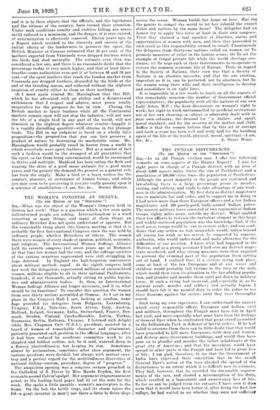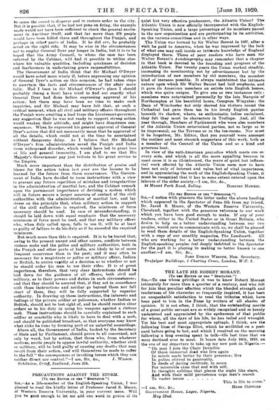THE PUNJAB DISTURBANCES.
[To THE EDITOR OF THE " SPECTATOR.") SIR,—As an old Punjab civilian may I offer the following remarks on some aspects of the Hunter Report? • I was for eight years in charge of a Punjab district With an area of about 5,000 square miles (twice' the size of Perthshire) and a population of 500,000 (four times the population of Perthshire). Although the great majority of the people are contented and law-abiding there is a large percentage prone to murder. rioting, and robbery, and ready to take advantage of any weak- ness in the administration. My first duty as district magistrate was to maintain law and order, and to support me in doing. SO I had never more than three European officers and a few Indian magistrates and 500 poorly-paid, badly-armed Indian police. The nearest military force consisted of two regiments of Indian troops, eighty miles away, outside my district. What enabled these few officers to restrain the turbulent element in this large and widely-scattered population was the knowledge that, if the need arose, troops would be tent to restore order, and our confi- dence that any action we took meanwhile would, unless beyond all reason too weak or too severe, be supported by superior authority, who would understand and make allowance for the difficulties of our position. I knew what had happened in the Mutiny, and as a young assistant I had seen my district magis- trate murdered, and what strong measures were then required to prevent the criminal part of the population from getting out of hand. I realized that, if a serious rising took place. some at least of the few Europeans and of our wives and children would probably fall victims to the fury of the mob, which would then turn its attention to the law-abiding popula- tion, and plunder and murder them until put down by military force. If such a rising had occurred, and especially if, as its natural result, murder and robbery had actually begun, I should have felt it my painful duty to order the police to use their firearms against the rioters until they were thoroughly cowed.
Such being my own experience, I can understand the anxiety which every responsible officer, European and Indian, civil and military, throughout the Punjab must hare felt in April last yeai, and more especially what must have been the feelings of General Dyer when he confronted that great crowd assembled
in the Jallianwala Park in defiance of lawful orders. If he had failed to overawe them there can be little doubt that they would have proceeded to kill more Europeans, both men and women, and destroy more Government buildings, and would then have gone on to plunder and murder the richer inhabitants of the great city of Amritsar; and that the movement would have spread to other parts of the Punjab and have led to great loss of life. I am glad, therefore, to see that the Government of India have expressed their conviction that in the result General Dyer's action at the time checked the spread of the disturbances to an extent which it is difficult now to estimate. They find, however, that he exceeded the reasonable require- ments of the ease, and showed a misconception of his duty. which resulted in a lamentable and unnecessary loss of life. So far as can be judged from the extracts I have seen it does seem that it would have been better if, after firing the first few volleys, he had waited to see whether they were not sufficient
to cause the crowd to disperse and to restore order in the city. But it is possible that, if he had not gone on firing, the example made would not have been sufficient to check the general excite- ment in Amritsar itself, and that far more than 379 people would have been killed there and throughout the Punjab, and perhaps in othee parts of India. If he did err, he probably erred on the right side. It may be wise in the cirournstances not to employ General Dyer any longer in India, but it is to be hoped that the Army Council, to whom the case has been referred by the Cabinet, will find it possible to ntilize else- where his valuable qualities, including quickness of decision and fearlessness in undertaking grave responsibilities.
The Government of India think that Sir Michael O'Dwyer would have acted more wisely if, before expressing any opinion of General Dyer's action on this occasion, he had taken steps to ascertain the facts and circumstances of the affair more fully. Had I been in Sir Michael O'Dwyer's place I should probably (being a Scot) have tried to find out exactly what General Dyer had done before expressing approval of his action; but there may have been no time to make such inquiries, and Sir Michael may have felt that, at such a critical moment, when all civil and military officers throughout the Punjab were awaiting a lead from the Lieutenant-governor, any suggestion fliat he was not ready to support strong action would weaken their attitude, and might have disastrous con- sequences. When he expressed his general approval of General Dyer's action that did not necessarily mean that he approved of all the details, which could not at the thne be ascertained without dangerous delay. As I believe that Sir Michael O'Dwyer's firm administration saved the Punjab and India from widespread disorder, which would have led to great loss of life and general insecurity, I am glad to see that His Majesty's Government pay just tribute to his great service to the Empire.
Much more important than the distribution of praise and blame for the action taken last year are the lessons to be learned for the future from these occurrences. The Govern- ment of India have decided to issue instructions with a view to prevent any future repetition of mistakes and irregularities in the administration of martial law, and the Cabinet remark upon the paramount importance of devising a system which will in future secure a larger measure of contact of the civil authorities with the administration of martial law, and lay stress on the principle that, when military action in support of the civil authorities is required, the minimum of force necessary should be used. In case of misunderstanding, it should be laid down with equal emphasis that the necessary minimum of force must be used, and that any military officer who, when duly called upon, fails to use it, will be at least as guilty of failure to do his duty as if he exceeded the required minimum.
But much more than this is required. It is to be feared that, owing to the present unrest and other causes, conflicts between riotous mobs and the police and military authorities, both in the Punjab and other parts of India, are likely to be of more frequent ocourrenoe than in the past; and it may often be necessary for a magistrate or police or military officer, Indian or British, to arrive rapidly at a decision as to whether or not he should order his men to use their rifles. It is of great importance, therefore, that very clear instructions should be laid down for the guidance of all officers, both civil and military, as to their powers and duties in such circumstances; and that they should be assured that, if they act in accordance with those instructions and neither go beyond them nor fall short of them, they will be fully supported by superior authority. In drawing up those instructions, the interests and feelings of the private soldier or policeman, whether Indian or British, should not be lost sight of, and he should receive clear orders as to his duty in using his weapons against a riotous mob. These instructions should be carefully explained to each soldier or constable who is likely to have to deal with a mob, and should be published broadcast, so that everyone may know what risks he runs by forming part of an unlawful assemblage.
Above all, the Government of India, backed by the Secretary of State and by Parliament, should prove to all concerned, not only by word, but by action, that those who, from whatever motives, excite people to oppose lawful authority, whether civil or military, will be held guilty of causing any deaths that may result from their action, and will themselves be made to suffer to the full " the consequences of invoking forces which they can neither direct nor control."—I am, Sir, &c., J. Wilma. Ochilview, Crieff, Scotland, June 5th.







































 Previous page
Previous page